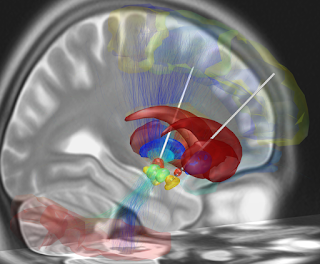Neuroethics Network and DBS

By Ethan Morris This post was written as part of a class assignment from students who took a neuroethics course with Dr. Rommelfanger in Paris of Summer 2016. Ethan Morris is a rising undergraduate senior at Emory University, majoring in Neuroscience and Behavioral Biology with a minor in History. Ethan is a member of the Dilks Lab at Emory and is a legislator on the Emory University Student Government Association. Ethan is from Denver, Colorado and loves to ski. One thought-provoking panel at the Paris Neuroethics Network discussed deep-brain stimulation, or DBS. DBS is a relatively novel treatment in which surgeons implant an electrode deep within the brain. When the electrode is turned on, it produces a current that has been shown to alleviate symptoms of Parkinson’s disease. Various studies have provided compelling evidence that DBS may also be an effective treatment for psychiatric disorders, such as major depression , especially when other treatment options are exhausted. ...
